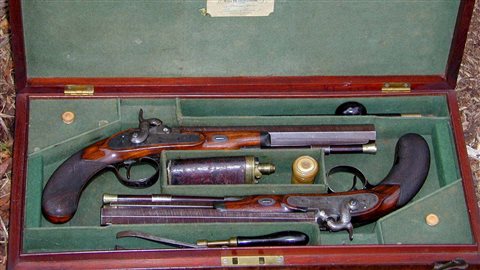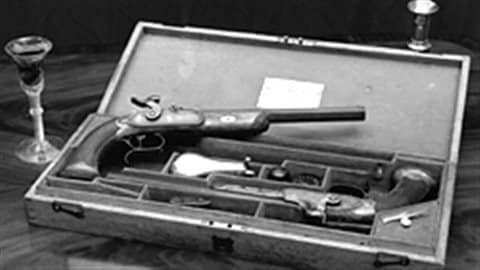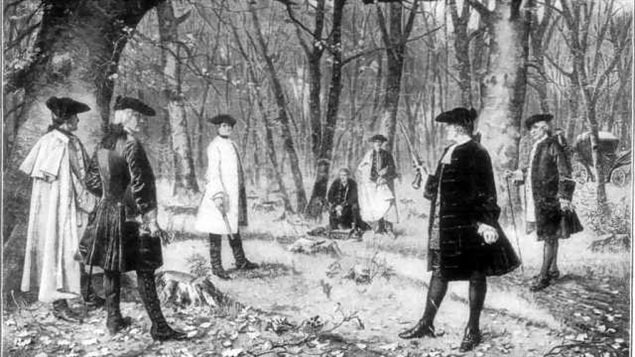It seems that almost from the time Europeans began to settle in the New World of Canada there were occasional duels to settle disputes at the rate of approximately one per year.
From the mid 1600’s to 1948, there were some 300 duelling “incidents” in the new land, later known as Canada. Many were challenges that were not accepted, while a smaller number were fought with little damage, but there were about 30 deaths.
The last fatal duel in what was then “Upper Canada” (Ontario) had been fought in 1833 and involved lawyers. Throughout Canada’s dueling history, most of the incidents involved either lawyers, politicians or military men.
Indeed the last fatal duel in what is now “Canada” was five years later in what was then Lower Canada, now the province of Quebec, and was indeed between two military men.

It should be remembered that duels were illegal and were almost always carried out furtively, but almost always involved members of the upper class. As the upper class also comprised the judiciary, when a combatant was killed, there was little desire to prosecute a murder trial, and perpetrators were almost always acquitted or given a minor sentence. When lesser classes were involved, as was sometimes the case in New France, duels were usually fought with swords, and the perpetrators did suffer the consequences. Under British rule however, duels were fought with pistols.
In at least one case, “Canadian” duelists sought to avoid the consequences of British law by dueling on US soil, while another in the wee hours of May 2 1820 went the other way with two American officers, Capt. Farley, and Lt. Fisher dueling on Canadian soil. Lt. Fisher was shot through the heart, but Farley was let off on murder charges as the duel was outside US jurisdiction.
One potential duel in Canada in 1836 was averted on the field. Two politicians S. DeBleury and C.O. Perrault got into a violent argument and met on a field. Placed about 12 metres apart, with pistols loaded, their seconds began to negotiate and eventually they agreed to apologize to each other and accept each other’s apology. Pistols were then fired into the air, and they all went to a tavern before returning to Quebec City.
The last fatal duel
As for the last fatal duel it was on May 22, 1838, and held on the newly built horse racing track in Verdun, now a borough of Montreal.
In this last fatal event, a British officer in the Montreal garrison — Major Henry Warde of the First Regiment of Foot, also known as “the Royals” —had made the mistake of sending a love letter to someone in the household of lawyer and militia Colonel Robert Sweeney.
Although there seems to be some doubt about who the intended recipient of the letter actually was, Sweeney took offence, presuming that the intended recipient of the letter was his wife (probably correctly), and challenged Maj. Warde to a duel.

In the early morning hours of May 22, 1838, the two, accompanied by their seconds and a crowd of spectators gathered at the new racetrack in Verdun. At the command they both fired and Warde was fatally wounded. He was carried to a nearby inn, La Pavillon, where he died.
Again, as duelling was a criminal offence, and as a death had occurred,, an inquest was held. Once again however, in an incident involving the elite members of society, no civilian witnesses were called despite the crowd at the scene.
The verdict was that Warde had died as a result of a gunshot wound “inflicted by some person unknown in a duel this morning”, declining to name Sweeney whose name had often come up in the press and was present through most of the inquest. He walked out a free man and in spite of subsequent news stories decrying the hypocrisy of the court.
However, the end of dueling was undoubtedly hastened by a decree from Queen Victoria.
Although duelling was illegal, the British military code stated that any officer refusing a duelling challenge, was likely to be cashiered. In 1844, Queen Victoria discussed the issue with Prime Minister Sir Robert Peel and that particular section of the Articles of War was repealed. It was instead replaced by an order to require the court martial and dismissal of any officer who duelled, challenged, acted as a second or failed to prevent duels.
That change ever after put a serious damper on hot tempers and duels throughout the British Empire, which included the future country of Canada







For reasons beyond our control, and for an undetermined period of time, our comment section is now closed. However, our social networks remain open to your contributions.